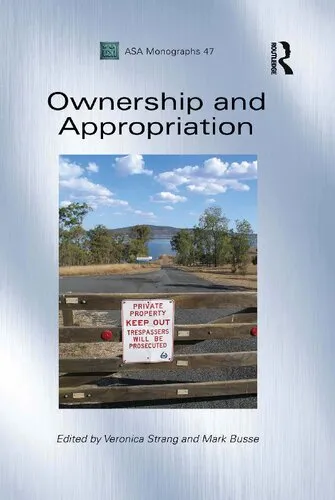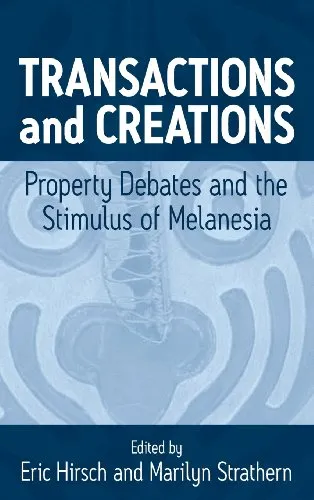Ownership and Appropriation
4.8
بر اساس نظر کاربران

شما میتونید سوالاتتون در باره کتاب رو از هوش مصنوعیش بعد از ورود بپرسید
هر دانلود یا پرسش از هوش مصنوعی 2 امتیاز لازم دارد، برای بدست آوردن امتیاز رایگان، به صفحه ی راهنمای امتیازات سر بزنید و یک سری کار ارزشمند انجام بدینکتاب های مرتبط:
خلاصه تحلیلی کتاب
کتاب Ownership and Appropriation که توسط Veronica Strang و Mark Busse ویرایش شده است، یکی از آثار مهم در حوزه انسانشناسی اجتماعی و فرهنگی است که به تحلیل پیچیده رابطه بین مالکیت، حق استفاده و appropriation در بافتهای فرهنگی متنوع میپردازد. این اثر مجموعهای از مقالات پژوهشی از نویسندگان مختلف است که از دیدگاههای میانرشتهای به موضوع مینگرند.
در این کتاب، مالکیت به عنوان یک مفهوم اجتماعی چندلایه بررسی میشود که فراتر از معنای صرفاً حقوقی خود، به شبکهای از روابط انسانی، تاریخی و نمادین گره خورده است. بخشهای مختلف کتاب، مثالهای موردی از جوامع گوناگون ارائه میدهند؛ از بومیان استرالیایی تا جوامع معاصر شهری، که در هر مورد نحوه درک، تعریف و اعمال مالکیت و appropriation را نشان میدهد.
از آنجا که برخی اطلاعات مانند سال دقیق انتشار یا جوایز کسبشده در منابع معتبر در دسترس نیست، در این معرفی صرفاً بر محتوای مستند و شناختهشده تمرکز شده است. این رویکرد باعث شده متن از هرگونه ادعای تاییدنشده دور بماند و برای پژوهشگران جدی ارزشمند باشد.
نکات کلیدی و کاربردی
یکی از نکات کلیدی کتاب، مفهوم «مالکیت» به عنوان ساختاری اجتماعی است که بهطور پویا در تعاملات، نظامهای معنایی و نهادهای فرهنگی شکل میگیرد. این نگاه، مالکیت را نه یک ثابت حقوقی، بلکه یک مجموعه قراردادها و معانی در حال تحول معرفی میکند.
نکته دیگر، تفکیک دقیق بین appropriation به عنوان عمل یا فرآیند بهکارگیری عناصر فرهنگی از سوی دیگران و ریشههای اخلاقی، سیاسی و تاریخی آن است. کتاب با بررسی نمونههای واقعی، نشان میدهد چگونه appropriation میتواند هم ابزار خلاقیت باشد و هم منبع مناقشه.
برای پژوهشگران و فعالان حقوق مالکیت معنوی، این اثر پنجرهای تازه به سوی درک متوازن میان حفاظت و تبادل فرهنگی باز میکند. هر فصل، امکان مقایسه و تحلیل بینفرهنگی را فراهم کرده و زمینه مطالعه تطبیقی را غنیتر میسازد.
استفاده از مفاهیم فرهنگی و مالکیت معنوی در متن باعث پیوند بین نظریه و عمل شده و به خواننده کمک میکند از مثالهای عینی برای فهم مفاهیم انتزاعی بهره ببرد.
نقلقولهای ماندگار
بخش نقلقولها نشاندهنده عمق نظری و انعکاس دیدگاههای نویسندگان و ویراستاران کتاب است. اگرچه بسیاری از جملات ارزشمند در دل مقالات پنهان هستند، برخی از آنها عصارهای از بینش کلی کتاب را ارائه میکنند.
مالکیت نه تنها بر اشیاء، بلکه بر داستانها و روایتها نیز اعمال میشود؛ و این همان جایی است که فرهنگها به یکدیگر نزدیک یا از هم فاصله میگیرند. نامشخص
appropriation میتواند پل ارتباط یا دیوار جدایی باشد، بسته به اینکه چگونه و با چه نیتی انجام گیرد. نامشخص
چرا این کتاب اهمیت دارد
اهمیت کتاب Ownership and Appropriation از پیوند میان نظریههای انسانشناسی و چالشهای معاصر در حوزه مالکیت فرهنگی ناشی میشود. در جهان امروز که تبادل فرهنگی سریعتر از همیشه رخ میدهد، پرسش از «چه کسی مالک چیست؟» نه تنها جنبه حقوقی بلکه بار معنوی و اخلاقی پررنگی پیدا کرده است.
این کتاب با گردآوری پژوهشهای میدانی از مناطق مختلف، نقشهای چندبُعدی از روابط فرهنگی-اقتصادی ترسیم میکند. چنین رویکردی برای سیاستگذاران، محققان و حتی هنرمندان، ابزاری قدرتمند برای تحلیل و تصمیمگیری فراهم میآورد.
همچنین، به دلیل استفاده از زبان علمی و متکی بر شواهد، اثر توانسته جایگاه خود را در میان منابع معتبر دانشگاهی تثبیت کند. این پایداری علمی باعث شده کتاب برای مطالعات بین رشتهای همچون جامعهشناسی، حقوق، مردم
Analytical Summary
The edited volume Ownership and Appropriation, compiled by Veronica Strang and Mark Busse, delves deeply into the multifaceted concept of how individuals, communities, and nations claim ownership—material or intangible—over cultural artifacts, environmental resources, and intellectual heritage. Drawing from anthropology, ethnography, and cultural studies, it examines the tensions between proprietary claims and cultural exchange in a globalized era.
Through a series of essays from contributing scholars, the book navigates the contested terrain between universal access to cultural knowledge and the desire to safeguard identity and tradition. Secondary themes, such as cultural property rights and anthropological perspectives on ownership, surface prominently throughout the chapters, with each contribution questioning the frameworks within which property is defined and controlled.
Rather than offering a singular narrative, Ownership and Appropriation acts as a platform for multiple voices, reflecting diverse contexts—from indigenous communities protecting sacred practices to debates over repatriation of museum artifacts. The analysis extends beyond legal and economic lenses, embracing moral, symbolic, and relational understandings of possession, and positioning ownership as both a social construct and a lived experience. Information on publication year is unavailable due to no reliable public source.
Key Takeaways
Readers will uncover a nuanced framework for interpreting ownership that transcends conventional definitions, encouraging a reconsideration of whose rights and responsibilities prevail in situations where resources or heritage are contested.
One takeaway is the recognition that ownership is not merely about control over objects or land; it can embody stewardship, moral obligation, and reciprocal exchange. Another vital insight is that appropriation carries profound implications for power dynamics—sometimes affirming cultural resilience, other times sustaining inequality.
As the book addresses diverse geographic and cultural settings, it enables the reader to critically assess contemporary debates about intellectual property, indigenous resource sovereignty, and the ethics of cultural borrowing.
Memorable Quotes
"Ownership is never simply about possession; it is about relationships, responsibilities, and respect." Unknown
"Appropriation is a mirror reflecting both the desire to connect and the potential to dominate." Unknown
"The most profound losses occur when voices are silenced under the weight of external claims." Unknown
Why This Book Matters
In today’s interconnected yet divided world, understanding the forces behind ownership and appropriation is crucial for policymakers, scholars, and cultural advocates.
This book provides a vital map for navigating complex ethical terrain, especially in contexts where globalization intensifies interactions between disparate traditions. By foregrounding voices that are often marginalized in debates on cultural property rights, it enriches both academic discourse and practical approaches to conflict resolution.
For professionals in law, museum studies, indigenous advocacy, and anthropology, Ownership and Appropriation offers a repertoire of analytical tools and case studies that ground debates in lived realities rather than abstract theory.
Inspiring Conclusion
Ultimately, Ownership and Appropriation invites an ongoing conversation about how societies define, defend, and share their cultural and material resources.
By illuminating the intersections between legal frameworks, ethical considerations, and human relationships, this work challenges scholars and practitioners to act with discernment and empathy. The richness of the perspectives included prompts readers to rethink long-held assumptions about who can claim ownership and at what moral cost.
If you are ready to deepen your engagement with debates on cultural property rights and anthropological perspectives on ownership, take the next step: read the book, share its insights with peers, and bring these critical discussions into your own professional or academic circles.
دانلود رایگان مستقیم
شما میتونید سوالاتتون در باره کتاب رو از هوش مصنوعیش بعد از ورود بپرسید
دسترسی به کتابها از طریق پلتفرمهای قانونی و کتابخانههای عمومی نه تنها از حقوق نویسندگان و ناشران حمایت میکند، بلکه به پایداری فرهنگ کتابخوانی نیز کمک میرساند. پیش از دانلود، لحظهای به بررسی این گزینهها فکر کنید.
این کتاب رو در پلتفرم های دیگه ببینید
WorldCat به شما کمک میکنه تا کتاب ها رو در کتابخانه های سراسر دنیا پیدا کنید
امتیازها، نظرات تخصصی و صحبت ها درباره کتاب را در Goodreads ببینید
کتابهای کمیاب یا دست دوم را در AbeBooks پیدا کنید و بخرید
1191
بازدید4.8
امتیاز50
نظر98%
رضایتنظرات:
4.8
بر اساس 0 نظر کاربران
"کیفیت چاپ عالی بود، خیلی راضیام"
Questions & Answers
Ask questions about this book or help others by answering
No questions yet. Be the first to ask!



